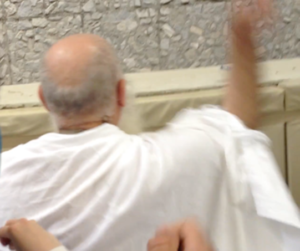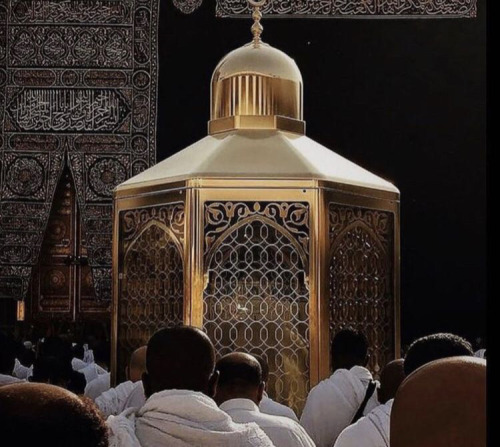After you finish at `Arafat, making tasbīħ , praising Allah (swt) all day long, you go to Muzdalifah, where everyone is busy collecting stones. What is the symbol of that? This whole universe is praising Allah (swt) and reciting tasbeeh, as Allah (swt) said in the Holy Qur’an:
, praising Allah (swt) all day long, you go to Muzdalifah, where everyone is busy collecting stones. What is the symbol of that? This whole universe is praising Allah (swt) and reciting tasbeeh, as Allah (swt) said in the Holy Qur’an:
وَإِن مِّن شَيْءٍ إِلاَّ يُسَبِّحُ بِحَمْدَهِ
And there is not a thing but celebrates His Praise.148
So, everything in the universe and in Heavens is making tasbeeh, but we cannot hear them. The Prophet (s), however, heard the tasbīħ and recitation of stones and mountains, whenever he passed by them.
When the Prophet (s) held stones in his blessed hands, Sayyīdinā Abū Bakr as-Siddiq (r) and Sayyīdinā `Umar (r) heard the tasbīħ of those stones. Imagine! Allah (swt) gave the Prophet (s) the ability to hear the tasbeeh of angels and everything in this universe to show His Love to Sayyīdinā Muhammad (s)!
So, what are these stones for? To take to Mina the next day and throw them at the biggest Shayţān, saying, “Raghman li ’sh-shayţān wa ridan li ’r-Raħmān, for Allah to be happy with us and for Shayţān to be down!” And the smaller the stones you collect, the more barakah, so don’t pick the large stones! Unfortunately, some people even take their shoes and throw them, which will be rendered by the angels on their face!
So, Allah (swt) likes it when you come back after making tasbīħ in `Arafat and Muzdalifah and throw stones at Shayţān, saying, “Allahu Akbar!” That is a symbol, to show that, “Yā Rabbīyy, I don’t want that Shayţān to be in me!”
Today they are rioting everywhere in the streets, they are not even sleeping, they are not even eating, their mouths are always open saying something. And Allah (swt) ordered us to remember Him:
وَالذَّاكِرِينَ اللَّهَ كَثِيرًا وَالذَّاكِرَاتِ
Men who remember God unceasingly and women who remember God unceasingly.149
To open your mouth for Allah (swt) to say, “Allah! Lā ilāha illa ’Llāh!”
O Muslims! Say, “Allah!” and let them do whatever they like: let them play, who cares for them? Say, “Lā ilāha illa ’Llāh, Lā ilāha illa ’Llāh, Lā ilāha illa ’Llāh!” Keep your mouth open with that. Is it not better for this crowd of four million to say, “Lā ilāha illa ’Llāh,” instead of carrying a Communist or Socialist or violent extremist banner? It’s okay to carry banners, but carry one for your own self.
Today I write a banner against my radical Shayţān, tomorrow I will write a banner against my violent Shayţān, tomorrow I will write a banner saying, “Leave me alone!” And what you have to say is not, “Go away,” to Shayţān, but you need to say, “Allah! Lā ilāha illa ’Llāh Muhammadan Rasūlullāh, yā Rabbīyy, yā Allah!”
What do you do when you go to `Arafat? Do you just sit there or do you open your mouth? In `Arafat you say, “Labbayk allahumma labbayk, Here I am, O Allah, Here I am. Lā ilāha illa ’Llāh, there is no god but Allah.” You are saying, “O Allah, I am here to answer what You want from me, Labbayk allahumma labbayk! I am making tawħīd, labbayk allahumma labbayk, Lā ilāha illa ’Llāh Muhammadan Rasūlullāh, inna ’l-ħamda wa ‘n-ni`amata laka wa ’l-mulk lā sharīka lak, everything to You!
What are they doing in these demonstrations? I am not saying don’t demonstrate, as they are doing throughout the sub-continent, the Middle East and North Africa, what must you do? Riot against your Shayţān and say, “Lā ilāha illa ’Llāh, Lā ilāha illa ’Llāh Lā ilāha illa ’Llāh!” What do you have to do in `Arafat? Do you have to keep your mouth closed or do you have to say, Labbayk allahumma labbayk inna ’l-ħamda wa ‘n-ni`amata laka wa ’l-mulk lā sharīka lak. You are praising Allah (swt).
Allah (swt) wants us to riot against Shayţān by praising Him. After you finish `Arafat, praising Allah all day, you go to Muzdalifah, where everyone is busy collecting stones. What is that a symbol of? What are the stones for? To go the next day, morning or noon, to throw seven stones at the biggest Shayţān, saying, “Allahu Akbar, ridan li ’r-Raħmān!” to make Allah happy with you. Raghman li ’sh-Shayţān, ridan li ’r-Raħmān! Throw them one by one, not all in one go. Allah (swt) likes if after making dhikr you come back saying, “Allahu Akbar!” and throw stones at Shayţān. That is a symbol: you are saying, “Yā Rabbīyy, I don’t want that Shayţān to be in me!”
Is that only for `Arafat and Mina? Can’t you do that in your daily life? `Arafat, Muzdalifah, Mina and Ka`bah are all in you, five times daily. When you say “Allahu Akbar,” and pray, to where do you direct yourself? The most significant events of Hajj are two things: one is to visit the Ka`bah, and the other is to be on the Mountain of `Arafat. You praise Him and then circumambulate His House. When you say “Allahu Akbar!” where are you going? Are you not going to His House spiritually? When you say “Allahu Akbar,” you must say it in a way that you are sure you are going to Ka`bah. You reflect and think that Ka`bah is in front of you when you are praying.
Hajj is `Arafat, and then you go and throw stones at Shayţān. That šalāt is throwing stones in Shayţān’s face, and is also remembering your Lord. Allah (swt) gave us to perform a symbolic Hajj five times daily. It is like fasting, you cannot eat or drink. Also, it is like giving charity, you are giving to Allah from your own time that He gave to you. And you are witnessing tawħīd, as at the end of the prayer you say, Ash-hadu an lā ilāha illa ’Llāh, wa ash-hadu anna Muhammadan `abduhu wa Ħabībuhu wa rasūluh, “I bear witness there is no god but Allah and Muhammad (s) is His Servant and Beloved Prophet (s)” In both sunnah and farļ prayers you have to say the Shahadah at the end.
O Muslims! Let us take Shayţān away from our hearts. Let us take `ibra, a lesson, from what is going on around the world. We want to get rid of the tyrants in the Muslim world, but remember you have to get rid of the tyrant inside you, the biggest tyrant!
REFERENCES
148 Sūratu ’l-‘Isrā, 17:44.
149 Sūratu ’l-Ahzaab, 33:35.
[Excerpted from the newly published book: Makkan Openings: A Pilgrim’s Guide to Divine Secrets]




